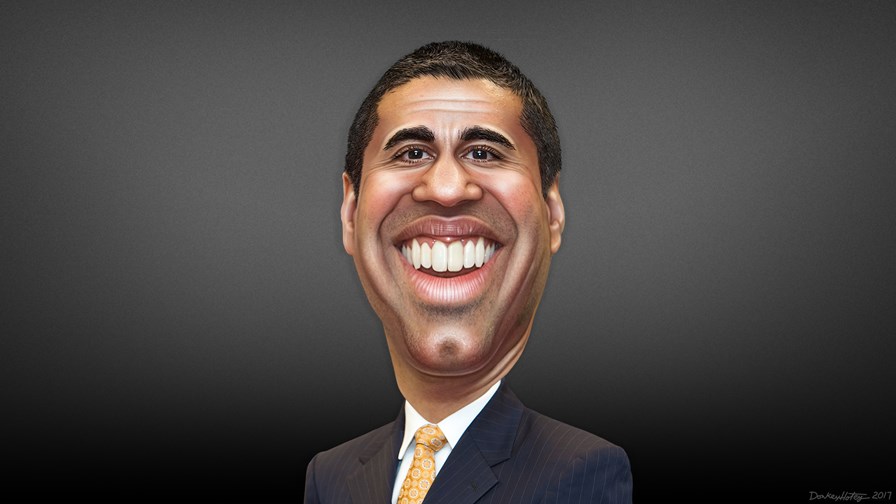
via Flickr © DonkeyHotey (CC BY 2.0)
- It’s Friday Pai-day again
- The various state initiatives to roll back the roll back of net neutrality continue
- Meanwhile Pai is in deep trouble for easing the passage of a huge media deal...
- ...one that shouldn’t have gone through, but did
It was fittingly The New York Times - that denizen of the ‘mainstream fake media’ as Donald Trump would have it - that broke the latest Pai story, via anonymous congressional aids. Apparently there is a top level regulator to regulate the FCC - he’s called the FCC’s Inspector General, and he is supposed to investigate possible cases of maladministration. He’s been alerted to Pai’s possible illegal behaviour over Sinclair Broadcasting’s $3.9 billion deal to buy Tribune Media — a deal made possible by rules pushed through by Pai just before the deal was sealed.
The ‘top Democrat’ on the congressional committee that oversees the FCC told The New York Times that the Inspector General was going to dig into Pai’s behaviour. The Times says the move will likely put a spotlight on Pai’s decisions and whether there had been coordination with the company. It may also force him to answer questions that he has so far avoided addressing in public, it says.
In fact Pai has quite a few questions to answer and to understand why it’s worth going back to contrast the business-friendly Pai approach to FCC regulation with the approach of his predecessor.
Tom Wheeler started life in the FCC chairman’s job under a cloud of suspicion, given that he was an ex-lobbyist for the cable and wireless industries. Net neutrality was a key concern in 2013 when his tenure began and he started badly in the eyes of net neutrality proponents by seeming to revert to type in his first few comments about net neutrality.
But in fact Wheeler turned out to be a diligent seeker after facts and his position soon swung around to firm pro-neutrality despite that long history of lobbying for corporate interests (or perhaps because of that long history - he knew all the tricks).
So when Wheeler eventually proposed that the big ISPs be reclassified as Title II providers, he did so after a long period of consultation which culminated in millions of online pro-neutrality submissions, some of them not even generated by the bucketload via spam email.
This is the way a regulator is supposed to behave - in the public interest, taking its views into account and carefully weighing the facts.
Pai’s approach has been rather different. He didn’t waste any time signalling his likely direction at an event staged by the ‘free market’ Free State Foundation early last year, before he was confirmed as chairman: "We need to fire up the weed whacker and remove those rules that are holding back investment, innovation, and job creation," said Pai, voicing the by then familiar anti-regulation rhetoric required of Trump appointees. It worked and Pai was duly appointed. We have no way of knowing whether the macho (and slightly ‘Godfather’ sounding) “weed whacker” reference helped swing the appointment, but it can’t have hurt.
Once in post the key weed to be whacked was of course net neutrality which, against all advice, Pai rolled back in one go rather than building a solid case.
The US legal system frowns upon this sort of thing. Yes, Pai conducted an online consultative process, but that was plagued by accusations of manipulation when a million or more pro-repeal submissions were discovered to have been bot-generated impersonations of the dead and the nonexistent. As a result Pai has spectacularly failed to build a case for his repeal action by showing what had changed between the reclassification to Title II and the original rule-making and the present day when he overturned it - certainly public opinion has not altered in the way Pai tried to prove.
Pai then played hardball to prevent law enforcement from tracking down the bot-masters.
If that wasn’t enough on its own for Pai’s own bot to be whacked, arguably the biggest outrage yet may prove to be the Sinclair case. Here Pai is accused of getting the FCC to approve rules allowing television broadcasters to greatly increase the number of stations they own. Just a few weeks later Sinclair Broadcasting announced its blockbuster deal.
As the Times points out Public interest groups and Democratic lawmakers are strongly opposed to the deal, since it would reduce the number of voices in the US media (especially liberal voices) and diminish coverage of local news. Of course Pai and the FCC say charges of collusion are baseless, but the Times points that its investigations last year found that Pai and his staff had been in correspondence with Sinclair executives and a meeting with Sinclair’s executive chairman took place just days before Trump appointed Pai chairman.
Interestingly, the language the lobbyist used about loosening the rules, says the Times, has tracked closely to analysis and language used by Pai in speeches favoring such changes.
I wonder if ‘weed’ or ‘whacker’ popped up in that linguistic analysis.
Email Newsletters
Sign up to receive TelecomTV's top news and videos, plus exclusive subscriber-only content direct to your inbox.




